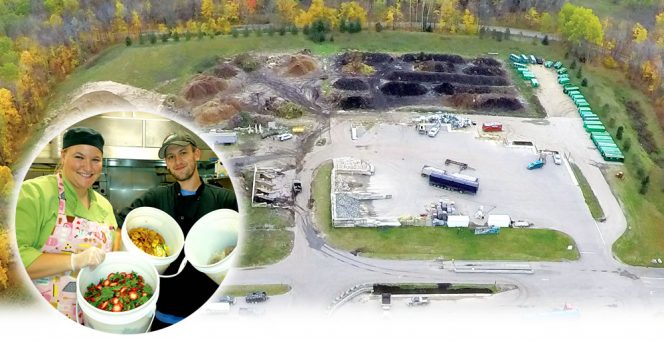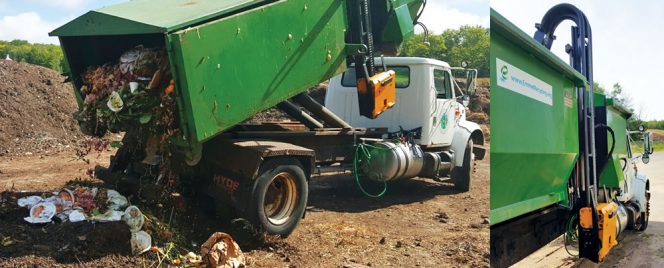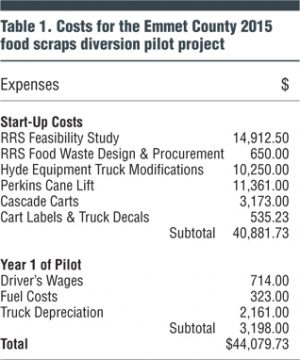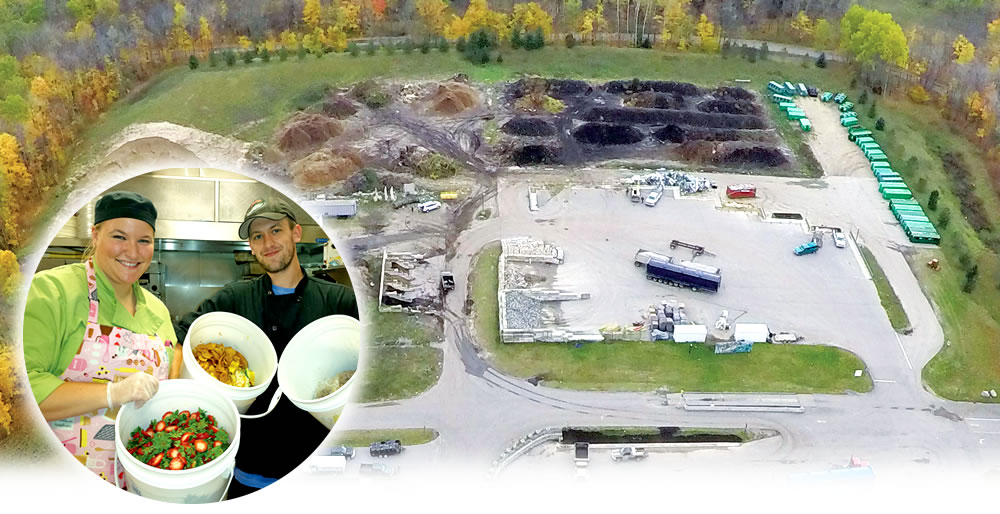Emmet County, Michigan conducted commercial food and floral scraps collection pilots in 2015 and 2016. Tonnages diverted increased by close to 50 percent this year.
Craig Coker and Elisa Seltzer
BioCycle December 2016

Food and floral scraps from the collection pilot (inset) have been composted at Emmet County’s existing yard trimmings composting site. Photos courtesy of Emmet County
There are 22 distinct governmental units in Emmet County, including a Native American tribe, 16 townships, 3 villages and two cities. County officials have developed a robust solid waste management system, consisting of a transfer station for municipal solid waste (MSW), 13 public drop-off sites for recyclables, a dual-stream materials recovery facility (MRF), and recycling outlets for 15 different bulky items. In 2015, Emmet County recycled 42 percent of the waste stream and disposed of the remaining 109,657 cubic yards (cy) of municipal solid waste, with the majority of that going to Republic Industries’ Elk Run Landfill in neighboring Presque Isle County. Curbside collection of recyclables is provided to the five most populous townships and municipalities in the county, representing 60 percent of the county’s households. Emmet County has been operating a yard trimmings composting facility since 2005.
In 2014, the county estimated that 30 percent of the waste it was landfilling was food waste, so it started exploring how to raise the recycling rate by collecting food scraps for composting at its yard trimmings facility. Several potential challenges were identified. Temperatures below freezing up to six months a year present difficulties for collection and processing and also mean a short growing season — which constrains demand for compost. Summer, in turn, brings a high number of vacationers who patronize food service establishments, which then generate large volumes of available commercial food scraps. Finally, a low population density (70 people per square mile) makes it difficult to design cost-efficient food scraps collection routing.
Emmet County had a feasibility study conducted by Resource Recovery Systems (RRS) to evaluate commercial food service outlets, residential sources and the capacity of the existing composting facility. The RRS report recommended implementation of a pilot program for commercial food service establishments in the Petoskey [the County seat] area. “The capital investment is relatively low and will be used to create and acquire equipment that will retain value in a back-up capacity for recycling use,” states the report. “If the pilot is successful and the program is expanded, the current composting facility is perfectly capable of processing organics from the county’s wasteshed. RRS also recommends building on existing qualitative research done by the county regarding perception of food waste collection and further confirming that a collection fee is not a barrier, as it is a critical revenue stream for a full residential program.”

The food scraps collection truck is equipped with a Perkin’s candy-cane lift to tip the 64-gallon carts used in the pilot program. Photos courtesy of Emmet County
Pilot Collection Program
In spring of 2015, Emmet County embarked on a 20-week pilot food scraps collection program that included 20 restaurants and flower shops in Petoskey and Harbor Springs. To help customers get up to speed, a Food Scrap Pilot “How To” Checklist, and a graphic poster of acceptable materials were developed. Sixty 64-gallon roll carts were purchased to distribute to pilot program participants, and an older 30-cy roll-off dumpster was equipped with a Perkins “candy-cane” lift for picking up and tipping the carts.
During the pilot, which ran from June to October 2015, the county collected food scraps and other source separated organics twice per week. Over 90,000 pounds (about 145 cy) of food and floral scraps were collected (total of 590 carts). Table 1 outlines the costs for the pilot. Start-up expenses included the feasibility study, program design, truck modifications, and equipment purchases (cane lift and carts) — a total of $40,881.73. Operating costs for the pilot were wages, fuel, and depreciation, which, for all equipment, was $2,161. Total operating costs are $3,198/year, or $71.07/ton for ongoing collection. Since Emmet County Solid Waste is an Enterprise Fund, it charges itself depreciation to fund long-term investments.
Participant Feedback
The county conducted post-pilot interviews with many of the participants. Some of their comments were: Clean, convenient and comprehensive; Food scraps program is actually easier than recycling; Twice a week service worked well, especially for flower shops because they receive deliveries two days a week; Can see how their prep cooks are preparing food, to help correct bad habits; Education materials were helpful, as was the driver; and Helped to identify further waste stream diversion opportunities.
The owner of a flower shop was interviewed about features of the flower scrap collection program that she liked the most. Her response was that the shop has always been recycling and had been self-hauling all its plant and flower waste to the composting facility since 2012. “So the reduced staff time and gained efficiencies were great,” noted the shop owner. “Our staff were very hip to the pilot program — they loved it! And we are proud that the business produces just one 30 gallon bag of trash weekly and 6 carts of recycling and plant scraps for composting.”
The shop owner said she would definitely pay to have four 64-gallon carts for its plant and flower scraps to be picked up twice a week. “We no longer landfill any flower waste to speak of,” said the owner. “With organics collection, even at the height of summer, we have just two 30-gallon bags weekly of trash.” The shop emphasizes local foods and local flowers sourcing. Similarly, the owner is interested in purchasing compost from the county composting facility in bulk. Every year she buys multiple skids/pallets worth of bagged potting soil and would prefer bulk quantities of compost, which can be used both in potted plants and as a direct planting medium.
The interviews also identified obstacles to successful food scraps diversion, which included adequate time, space and staff inside the generators’ operations and that it was hard to assess the impact on overall solid waste management costs. County staff assessed the success of the pilot and noted:
• Some businesses were willing to pay for the diversion, but others were not, particularly if they had previous experience diverting food scraps for animal feed.
• They were surprised by the quantities of diverted SSO from florists.
• Contamination was kept to a minimum by only accepting preconsumer food scraps.
Based on the success of the pilot, the program was renewed in 2016, and ran from April to November. Through early October, almost 220,000 pounds of food and floral scraps were captured in 993 roll carts tipped at the composting facility — a 47 percent increase in volume over 2015. The county added its first large-volume generator (the Odawa Casino), which provided 24 percent of the volume received in 2016. Emmet County has determined that the per roll cart collection fee (starting at $7/tip for a single cart, with cost-savings for multiple carts) is covering the costs of the diversion program. It also has expanded sales of compost to include a bagged product.
Future program expansion will include adding larger volume generators, piloting winter collection, expanding compost sales, developing source separated organics drop-off sites for residential customers, establishing a fats/oils/grease (FOG) drop off for residents, and increasing diversion by encouraging more use of backyard composting bins.
Craig Coker is a Senior Editor at BioCycle and CEO of the firm Coker Composting & Consulting (www.cokercompost.com), near Roanoke VA. He can be reached at cscoker@jgpress.com. Elisa Seltzer is Director of Public Works for Emmet County, Michigan. She can be reached at eseltzer@emmetcounty.org.











